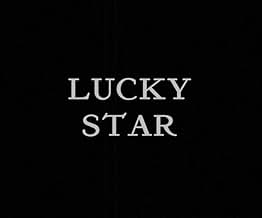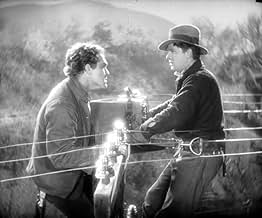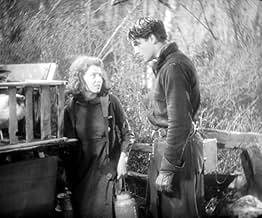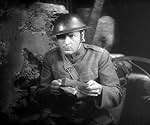Lucky Star
- 1929
- 1 Std. 40 Min.
IMDb-BEWERTUNG
7,6/10
1635
IHRE BEWERTUNG
Füge eine Handlung in deiner Sprache hinzuMary, a poor farm girl, meets Tim just as word comes that war has been declared.Mary, a poor farm girl, meets Tim just as word comes that war has been declared.Mary, a poor farm girl, meets Tim just as word comes that war has been declared.
- Auszeichnungen
- 1 wins total
Empfohlene Bewertungen
This was my first exposure to Janet Gaynor, and I fell in love with her. She plays a poor, ragamuffin country girl who begins a timid romance with a wheelchair-bound WWI veteran (Charles Farrell), against the stern wishes of her mother, who wants her to marry instead a swaggering bully. Director Frank Borzage keeps the potential mawkish sentimentality at bay, and pulls achingly beautiful and naturalistic performances from his actors. When you watch Gaynor's face in this film, able to convey heaps of emotion (just get a look at her when she first realizes Farrell is confined to a wheelchair) with the most nuanced of glances, it's no surprise that she was able to make a successful transition to sound film and continue as a huge star and box-office draw throughout the 1930s.
The forbidden love storyline is the stuff of standard silent film melodrama, as is the suspenseful race-against-time finale that finds Charles Farrell willing himself to walk so that he can get to Gaynor before her husband-to-be takes her away forever. All of that is as silly as it sounds. But it's the quieter moments that give this film its gentle appeal: like the surprisingly erotic scene in which Farrell decides Gaynor needs a makeover and washes her hair with the yolks of a dozen eggs; or the beautiful bittersweet moment when Farrell gives Gaynor a gold bracelet that looks like an over-sized wedding ring.
A film center in Chicago is showing a festival of Gaynor and/or Borzage films, and I look forward to seeing more of both of them.
Grade: A
The forbidden love storyline is the stuff of standard silent film melodrama, as is the suspenseful race-against-time finale that finds Charles Farrell willing himself to walk so that he can get to Gaynor before her husband-to-be takes her away forever. All of that is as silly as it sounds. But it's the quieter moments that give this film its gentle appeal: like the surprisingly erotic scene in which Farrell decides Gaynor needs a makeover and washes her hair with the yolks of a dozen eggs; or the beautiful bittersweet moment when Farrell gives Gaynor a gold bracelet that looks like an over-sized wedding ring.
A film center in Chicago is showing a festival of Gaynor and/or Borzage films, and I look forward to seeing more of both of them.
Grade: A
LUCKY STAR (Fox, 1929), directed by Frank Borzage, follows the familiar pattern of sentimental love stories most associated with director and his young romantic team of Janet Gaynor and Charles Farrell. For their third screen venture together, following the success of SEVENTH HEAVEN (1927) and STREET ANGEL (1928), Borzage works wonders with them again in the story based on Tristram Tupper's "Three Episodes in the Life of Timothy Osborn" by which Farrell's character dominates the screen, but whenever together with Gaynor, they're quite equivalent. LUCKY STAR seems to be an odd title for the selected story in question since it's not one that takes place in Hollywood as did Gaynor's much latter success of A STAR IS BORN (1937). Regardless of what it's titled, as Gaynor's character would frequently say, "that's gran."
The scenario takes place in a rural setting on a farm where the widowed "Ma" Tucker (Hedwig Reicher)raises her four yungins, the eldest being Mary (Janet Gaynor). After driving her horse and buggy to town selling drinking items to electrical linemen for a nickel, she attracts the attention of Timothy Osborn (Charles Farrell) working on top of the telephone pole. Trying to cheat Martin Wrenn (Guinn Williams), the foreman, by acquiring an extra nickel from him with the indication she wasn't paid, Timothy comes to the girl's defense which starts a fight between him and Wrenn on top of the pole. The fight is interrupted with the news that war has been declared. Before Timothy enlists with Wrenn, he gives Mary a spanking for hiding the nickel thrown to her by his foreman. After two years in France at the war front, Wrenn returns home from the Army still retaining his sergeant's uniform while Timothy, having met with serious accident, is wheelchair bound, living alone in his cottage fixing broken things to keep busy. Still remembering the spanking, Mary (now 18) throws a stone through Timothy's window, but after meeting again, they soon become the best of friends, with Timothy affectionately giving Mary the pet name of "Baa Baa." When forbidden by her mother to have anything to do with the crippled Timothy, Mary passes Wrenn off as the escort who walked her home from the barn dance. Taking an immediate liking to Wrenn, Mrs. Tucker sees a great opportunity for a better lifestyle for all by arranging for Mary to marry Wrenn, regardless of her true love for Timothy.
With all the elements of an early D.W. Griffith rural melodrama, LUCKY STAR rightfully belongs to Borzage, through fine visuals and the re-inventing of certain aspects that played so well with SEVENTH HEAVEN. The World War is worked into the plot once again, but to a limited degree. However, poor Gaynor plays an abused urchin, substituting the whipping from her older sister to facial slaps from her oppressed mother. The one who gathers more sympathy turns out to be Timothy (Farrell), especially during the film's second portion as a handicapped war veteran rather. As much as Gaynor gathers much attention with her sympathetic charm and fragile round face, this time Borzage gives Farrell the opportunity with crucial scenes where, after hugging Mary, his facial expression, telling more than actual words, who, at that very moment, comes to realize how much he loves her; along with Timothy's struggling attempt to walk again by holding on to his crutches and falling off from them. Another scene worth mentioning, played more for laughs than tears, has Timothy washings Mary's hair with a dozen eggs, resulting to Mary's hair resembling that of Little Orphan Annie's. Scenes involving Farrell and Williams starts off in humorous fashion between two men as friends one moment and fist fighting the next. Their sort of friendship comes to a halt as Wrenn interferes with Timothy's romance. Other members of the cast include Paul Fix (Joe); Gloria Grey (Flora Smith); and Hector V. Sarno ("Pop" Fry).
Released at a time when talkies were dominant over silents, a few lines of spoken dialog were inserted into the story between the two lucky stars during its initial theatrical run. LUCKY STAR, which had been out of circulation since its initial release, was thought to be among the many missing from the silent era. However, the film was finally discovered, with talking sequences no longer available, restored by the Netherlands Film Museum, and unveiled in 1991, notably at the Telluride Film Festival and the Museum of Fine Arts with piano accompaniment by Bob Winter, and other revival movie houses before cable television broadcast on Turner Classic Movies (TCM premiere: October 9, 2012).
Never distributed on home video, a long awaited release onto DVD became a reality in 2008 as part of the Frank Borzage collection for 20th Century Fox Home Entertainment. The print not only contains newly inserted inter-titles, but a new but somewhat unsatisfactory musical score composed and conduced by Christopher Caliendo, making one long for recovery of the lost Movietone soundtrack that accompanied the film back in 1929. The rediscovery of LUCKY STAR, overall, gives film scholars and historians a rare opportunity viewing Gaynor and Farrell at their prime, thanks to the fine direction of Frank Borzage. (***)
The scenario takes place in a rural setting on a farm where the widowed "Ma" Tucker (Hedwig Reicher)raises her four yungins, the eldest being Mary (Janet Gaynor). After driving her horse and buggy to town selling drinking items to electrical linemen for a nickel, she attracts the attention of Timothy Osborn (Charles Farrell) working on top of the telephone pole. Trying to cheat Martin Wrenn (Guinn Williams), the foreman, by acquiring an extra nickel from him with the indication she wasn't paid, Timothy comes to the girl's defense which starts a fight between him and Wrenn on top of the pole. The fight is interrupted with the news that war has been declared. Before Timothy enlists with Wrenn, he gives Mary a spanking for hiding the nickel thrown to her by his foreman. After two years in France at the war front, Wrenn returns home from the Army still retaining his sergeant's uniform while Timothy, having met with serious accident, is wheelchair bound, living alone in his cottage fixing broken things to keep busy. Still remembering the spanking, Mary (now 18) throws a stone through Timothy's window, but after meeting again, they soon become the best of friends, with Timothy affectionately giving Mary the pet name of "Baa Baa." When forbidden by her mother to have anything to do with the crippled Timothy, Mary passes Wrenn off as the escort who walked her home from the barn dance. Taking an immediate liking to Wrenn, Mrs. Tucker sees a great opportunity for a better lifestyle for all by arranging for Mary to marry Wrenn, regardless of her true love for Timothy.
With all the elements of an early D.W. Griffith rural melodrama, LUCKY STAR rightfully belongs to Borzage, through fine visuals and the re-inventing of certain aspects that played so well with SEVENTH HEAVEN. The World War is worked into the plot once again, but to a limited degree. However, poor Gaynor plays an abused urchin, substituting the whipping from her older sister to facial slaps from her oppressed mother. The one who gathers more sympathy turns out to be Timothy (Farrell), especially during the film's second portion as a handicapped war veteran rather. As much as Gaynor gathers much attention with her sympathetic charm and fragile round face, this time Borzage gives Farrell the opportunity with crucial scenes where, after hugging Mary, his facial expression, telling more than actual words, who, at that very moment, comes to realize how much he loves her; along with Timothy's struggling attempt to walk again by holding on to his crutches and falling off from them. Another scene worth mentioning, played more for laughs than tears, has Timothy washings Mary's hair with a dozen eggs, resulting to Mary's hair resembling that of Little Orphan Annie's. Scenes involving Farrell and Williams starts off in humorous fashion between two men as friends one moment and fist fighting the next. Their sort of friendship comes to a halt as Wrenn interferes with Timothy's romance. Other members of the cast include Paul Fix (Joe); Gloria Grey (Flora Smith); and Hector V. Sarno ("Pop" Fry).
Released at a time when talkies were dominant over silents, a few lines of spoken dialog were inserted into the story between the two lucky stars during its initial theatrical run. LUCKY STAR, which had been out of circulation since its initial release, was thought to be among the many missing from the silent era. However, the film was finally discovered, with talking sequences no longer available, restored by the Netherlands Film Museum, and unveiled in 1991, notably at the Telluride Film Festival and the Museum of Fine Arts with piano accompaniment by Bob Winter, and other revival movie houses before cable television broadcast on Turner Classic Movies (TCM premiere: October 9, 2012).
Never distributed on home video, a long awaited release onto DVD became a reality in 2008 as part of the Frank Borzage collection for 20th Century Fox Home Entertainment. The print not only contains newly inserted inter-titles, but a new but somewhat unsatisfactory musical score composed and conduced by Christopher Caliendo, making one long for recovery of the lost Movietone soundtrack that accompanied the film back in 1929. The rediscovery of LUCKY STAR, overall, gives film scholars and historians a rare opportunity viewing Gaynor and Farrell at their prime, thanks to the fine direction of Frank Borzage. (***)
I wholeheartedly concur with the first reviewer. This is one of the most perfectly crafted of all silent masterpieces, and a further evidence that sound was unnecessary to produce such poignant and moving images. I was amazed how extremely haunting and luminous this movie was. There is no greater degree of luminosity; each scene is a lush, radiant extension of a romantic painting. The brief war scenes alone surpass those in "7th Heaven" and the ethereal romantic moments between Charles Farrell and Janet Gaynor match theirs in "Street Angel". I love that scene in which Farrel tells Gaynor why he's on the wheelchair. The photography and story may owe a lot to Murnau's epochal "Sunrise" but most of the material is Borzage's own.
Don't miss it.
Don't miss it.
This film was the last silent film Charles Farrell and Janet Gaynor made as a team, and their soulful chemistry is more evident in this film than any other they made together. Is this movie so poignant because it marked the end of their silent career together, or because they had really reached the peak of their artistry together? This was also their last film with director Borzage, who also reached the peak of his art with this film.
To me, LUCKY STAR also demonstrates what made Farrell great as an actor. Although he is often unfavorably compared to Gaynor, he is restrained, elegant, and utterly believable as the handicapped Timothy Osborne. The scene in which he bathes Janet, or later when they embrace before she heads off to the party, is masterful. His expression tears your heart out.
If you have a chance to see this film, please do--you won't be sorry. This is the kind of film that makes you realize how truly great the art of silent cinema was (and remains). 10 stars.
To me, LUCKY STAR also demonstrates what made Farrell great as an actor. Although he is often unfavorably compared to Gaynor, he is restrained, elegant, and utterly believable as the handicapped Timothy Osborne. The scene in which he bathes Janet, or later when they embrace before she heads off to the party, is masterful. His expression tears your heart out.
If you have a chance to see this film, please do--you won't be sorry. This is the kind of film that makes you realize how truly great the art of silent cinema was (and remains). 10 stars.
Lucky Star is a lovely film. It's good to have a contrast, I ended up watching ten minutes of the Fantastic Four before this film. So after that incredible dross, the Borzage was a double-barrelled blast of wonder to the face. It's a very simple movie story-wise. We start off looking at a farm very early in the morning, still dark, it's awesomely Gothic, probably a set because it's so perfect, but you can't tell. You got these windy lanes and crooked fenceposts and creepy trees. Mary (Janet Gaynor) a dirty and chiselling but winsome little ragamuffin lives on the farm with her Ma and some littl'uns, Pa ain't around. She's milking the cow, probably at five in the morning, when the house is getting up. You can tell that life is pretty hard. It's about 2 minutes of cinema that's more precious than a dozen movies.
Anyway there's these two men Wrenn and Tim. Wrenn is a lazy good-fer-nuthin who is the foreman of the telegraph gang. Tim is the one he always gets to do the hard work. World War One comes and these guys decide to get a load of the world and pack off to France. Anyway we're shown in no uncertain terms during this episode how Tim is a nice guy and Wrenn, well he ain't. Private Tim ends up in a wheelchair when he gets back, on account of Sergeant Wrenn.
Mary is a grown up now, and Tim and Wrenn are vying for her affections. Wrenn has got the head start because he's a blackguard and he's not crippled. So it's a love story. It all seems real simple, but the nuance is what it's all about, the exquisite lighting and camera-work, the great partnership between Gaynor (Mary) and Farrell (Tim), and the heart-rending final scenes. It's simply a charming innocent movie, that there's no way could be made any more.
Tim has to undergo a harrowing struggle in order to get the girl. The snow scenes towards the end have to be seen to be believed.
Anyway there's these two men Wrenn and Tim. Wrenn is a lazy good-fer-nuthin who is the foreman of the telegraph gang. Tim is the one he always gets to do the hard work. World War One comes and these guys decide to get a load of the world and pack off to France. Anyway we're shown in no uncertain terms during this episode how Tim is a nice guy and Wrenn, well he ain't. Private Tim ends up in a wheelchair when he gets back, on account of Sergeant Wrenn.
Mary is a grown up now, and Tim and Wrenn are vying for her affections. Wrenn has got the head start because he's a blackguard and he's not crippled. So it's a love story. It all seems real simple, but the nuance is what it's all about, the exquisite lighting and camera-work, the great partnership between Gaynor (Mary) and Farrell (Tim), and the heart-rending final scenes. It's simply a charming innocent movie, that there's no way could be made any more.
Tim has to undergo a harrowing struggle in order to get the girl. The snow scenes towards the end have to be seen to be believed.
Wusstest du schon
- WissenswertesAccording the Netherlands Film Museum, which restored "Lucky Star", the film was originally a part talkie, with some dialog and effects, but the soundtrack has been lost.
- Zitate
Mary Tucker: What's the matter with your feet?
Timothy Osborn: Nothing - just saving my legs.
Mary Tucker: What you savin' 'em for?
Timothy Osborn: For a special occasion.
- VerbindungenFeatured in Murnau, Borzage and Fox (2008)
Top-Auswahl
Melde dich zum Bewerten an und greife auf die Watchlist für personalisierte Empfehlungen zu.
Details
- Laufzeit1 Stunde 40 Minuten
- Farbe
- Sound-Mix
Zu dieser Seite beitragen
Bearbeitung vorschlagen oder fehlenden Inhalt hinzufügen





























